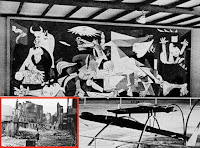The Civil War
THE CIVIL WAR (1936-1939):
On July 17, 1936, the military insurrection began in Melilla and extended to the peninsula and archipelagos. The peninsula was divided into two camps, the national zone and the republican zone.
Franco requested air support to Germany and Italy (both in fascist dictatorships) thus creating the "airlift" that helped displace all the troops and move forward along the peninsula. They were advancing to Madrid where they met the "International Brigades" a corps of communist volunteers with tanks and Russian planes. In such a way that they stopped the conquest of the capital.
Franco continued advancing close to the capital and managed to advance to the north, where the famous bombardment of Guernica carried out by the Condor Legion sent by Hitler took place.
 |
| Bombardment of Guernica, Picasso´s paint. |
In September 1939 the Second World War broke out and, despite Hitler's help, Spain remained on the sidelines given the deep crisis in which the country was immersed after the war; Only a small group of volunteers came to help the Nazis against the Soviets.
Consequences of the war:
- About 400,000 dead;
- Destruction of buildings, churches and houses in several cities;
- Destruction in the field with losses for agriculture and livestock;
- Decrease of about 30% of the Spanish income (national income and per capita income will not recover until 1950).
 |
| Cost of foreign troops |
 |
| Evolution of the Spanish trade balance |
 |
| Evolution of Spanish trade |
 |
| Evolution of the republican trade |
 |
| Imports of armaments |
The evolution of the Republican zone:
Failure triggered a social revolution, and the committees of the Workers ' parties and labor unions went on to control the economy. The government presided by Largo Caballero was composed of workers ' committees and militias that were facing each other: CNT-FAI and POUM; With PSOE and PCE. The new government presided it Negrín and leaned more towards the PCE given the Soviet aid, but new positions of anarchists and socialists begin to appear as the necessity to negotiate given the imminentness of the defeat. Finally, Negrín was evicted from power by the coup of the married colonel and finally, Franco demanded unconditional surrender.
The evolution of the National zone:
They created the National Defense Board as a provisional body of government in which they established the state of war, abolished all liberties and dissolved all political parties except the Falange and the Carlist requetés. Economic measures were the cancellation of all republican reforms and state intervention in the economy. Franco was appointed head of the Spanish state Government, the Caudillo, and establishes a personal dictatorship based on a military regime with a State technical board as the dictator's consultative body. They approved the decree of unification, with what Falangists and Carlists became a traditionalist Spanish phalanx and of the JONS (FET de las JONS). All the powers of the state were concentrated in Franco, censorship was established and trade union freedoms ended. It was established the national-Catholicism and the law of political responsibilities to judge as rebels anyone who acted against the national movement.


Comentarios
Publicar un comentario